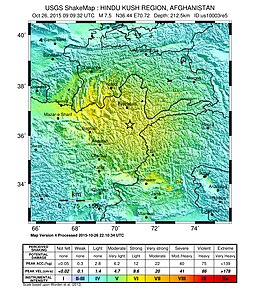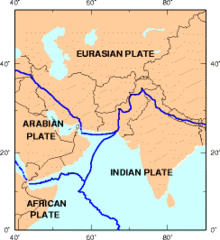October 2015 Hindu Kush earthquake
 | |
| UTC time | 2015-10-26 09:09:42 |
|---|---|
| ISC event | 612180979 |
| USGS-ANSS | ComCat |
| Local date | 26 October 2015 |
| Local time | 13:39 AFT, 14:09 PKT, 14:39 IST[1][2] |
| Magnitude | 7.5 Mw[1][2] |
| Depth | 231.0 km (143.5 mi)[1] |
| Epicenter | 36°31′26″N 70°22′05″E / 36.524°N 70.368°E[1] |
| Type | Reverse[1] |
| Areas affected | |
| Max. intensity | MMI VII (Very strong) |
| Casualties | 399 deaths and 2,536 injured |
The October 2015 Hindu Kush earthquake was a magnitude 7.5 earthquake[1][2] that struck South Asia on 26 October 2015, at 13:39 AFT (14:09 PKT; 14:39 IST; 09:09 UTC)[1][2][3] with the epicenter 45 km north of Kuran wa Munjan, Afghanistan,[4][5] at a depth of 231.0 km.[6]
By 5 November, it was estimated that at least 399 people were killed, mostly in Pakistan.[7][8][9][10] Tremors were felt in Pakistan, Uzbekistan, Turkmenistan,[11] Tajikistan and Kyrgyzstan.[12][13][14] According to the United States Geological Survey (USGS), Pakistan is located in one of the most earthquake active zones in the world.[15] The earthquake was also felt in New Delhi, in both Pakistan's Azad Kashmir territory, and the Indian state of Jammu and Kashmir and as far as Lucknow and in the prefectures of Kashgar, Aksu, Hotan, and Kizilsu in Xinjiang, China while damage was also reported in Afghan capital Kabul.[8][16] The earthquake was also felt in the Nepalese capital of Kathmandu.
Background
[edit]
The Himalayan mountains, pushed up by the collision of tectonic plates, are prone to devastating quakes. An earthquake in April 2015, Nepal's worst in 80 years, killed over 8,600 people.[17]
The last major earthquake in the same region of similar magnitude (7.6 Mw) was almost exactly ten years prior in October 2005, which resulted in 87,351 deaths, 75,266 injured, 2.8 million people being displaced, and 250,000 farm animals dying. The notable difference between this earthquake and the 2005 earthquake is the focal depth and its location with respect to the densely populated areas.[18] The 2005 earthquake was 15 km deep and centered close to some densely populated areas while this earthquake was 212.5 km deep and centered farther from populated areas, reducing its damaging effects.[19]
In recent studies, geologists claim that global warming is one of the reasons for increased seismic activity. According to these studies melting glaciers and rising sea levels disturb the balance of pressure on Earth's tectonic plates thus causing an increase in the frequency and intensity of earthquakes. This could be one of the reasons why the Himalayas are getting more prone to earthquakes in recent years.[20][better source needed]
Earthquake
[edit]The main earthquake occurred on 26 October 2015 at 13:39 AFT (14:09 PKT, 14:39 IST, 09:09 UTC)[1][2] at a depth of approximately 231.0 km, with its epicenter approximately 82 km southeast of Feyzabad, Afghanistan. The USGS initially measured the quake's magnitude at 7.7, then revised it down to 7.6 and later to 7.5. The Pakistan Meteorological Department, however, said the magnitude of the earthquake was 8.1.[21] According to USGS, the epicentre was 67 km from Chitral.[22][23][24]
Damage and casualties
[edit]Afghanistan
[edit]| Province | Deaths | Injuries |
|---|---|---|
| Badakhshan | 9 | 21 |
| Baghlan | 0 | 8 |
| Kabul | 0 | 21 |
| Kunar | 22 | 64 |
| Laghman | 4 | 0 |
| Nangarhar | 8 | 82 |
| Nuristan | 4 | 0 |
| Parwan | 0 | 30 |
| Takhar | 12 | 39 |
| Unspecified | 56 | 273 |
At least 115 people were killed and 538 others were injured in Afghanistan.[8][9] Among the fatalities were five in Jalalabad, and 12 schoolgirls aged 10 to 15 who died in a crowd crush while trying to exit a school building in Takhar.[9][non-primary source needed][26][27][25]
Pakistan
[edit]The earthquake resulted in 280 fatalities, 1,770 injuries, and damage to 109,123 buildings.[7][28] There were 202 deaths and 1,486 injuries in Khyber Pakhtunkhwa; 30 deaths and 59 injured in the Federally Administered Tribal Areas; nine deaths and 30 injuries in Gilgit-Baltistan; five deaths and 78 injuries in Punjab and two deaths and 12 injuries in Azad Kashmir.[25] The most affected areas from Khyber Pakhtunkhwa include Shangla, Lower Dir, Upper Dir, Swat and Chitral, which were in close proximity of the epicenter.[29][28] As a result of land sliding, the Karakoram Highway was closed.[30] The observed damage was mostly concentrated in rural and old urban masonry buildings, both being built with no or minimal consideration for earthquake loading and having been constructed employing poor construction practices.[31]
India
[edit]Four people were killed and 20 others were injured in Jammu and Kashmir.[10] A Delhi Metro spokesman told AFP "All of around 190 trains plying on the tracks were stopped at the time of the earthquake." Mobile phone services were choked for several hours because of the high voice traffic.[32]
Tajikistan
[edit]In Tajikistan, 14 children suffered injuries in Yovon District when stairs at a local school collapsed.[33]
Rescue and relief
[edit] Pakistan
Pakistan- Pakistani Prime Minister Nawaz Sharif directed all federal, civil, military and provincial agencies to declare an immediate alert and mobilise all resources to ensure the security of citizens of Pakistan. According to Inter-Services Public Relations, Chief of Army Staff General Raheel Sharif has directed army personnel to reach out where required to help affected people without waiting for orders.[22][23]
 Afghanistan
Afghanistan- Chief executive officer of Afghanistan Abdullah Abdullah called an emergency meeting of senior officials to respond to the disaster.[34]
 India
India- The Indian Prime Minister, Narendra Modi, contacted Afghan President Ashraf Ghani and Pakistani Prime Minister Nawaz Sharif and offered help.[35]
 United Nations
United Nations- According to UN Secretary-General Ban Ki-moon, UN agencies are mobilizing to assist Pakistani and Afghan relief operations.[36]
See also
[edit]- List of earthquakes in 2015
- List of earthquakes in Afghanistan
- List of earthquakes in Pakistan
- Thrust tectonics
References
[edit]- ^ a b c d e f g h "M7.5 – 45 km N of 'Alaqahdari-ye Kiran wa Munjan, Afghanistan". United States Geological Survey. 26 October 2015.
- ^ a b c d e National Geophysical Research Institute (26 October 2015). "afg.doc" (PDF). Archived from the original (PDF) on 3 March 2016. Retrieved 28 October 2015.
- ^ "M 7.7 Earthquake 45 km SSW of Jarm, Afghanistan". 26 October 2015.
- ^ "Map of the earthquake M7.5 – 45 km N of 'Alaqahdari-ye Kiran wa Munjan, Afghanistan". 26 October 2015.
- ^ "M7.5 – 45 km N of 'Alaqahdari-ye Kiran wa Munjan, Afghanistan". United States Geological Survey. 26 October 2015. Retrieved 26 October 2015.
- ^ "Pakistan and Afghanistan rocked by Earthquake". The Guardian. 26 October 2015. Retrieved 26 October 2015.
- ^ a b "Live Updates". ndma.gov.pk. Archived from the original on 21 November 2015. Retrieved 5 January 2015.
- ^ a b c "The Latest: UN Mobilizing to Aid Quake Victims". United States: ABC News. Associated Press. 26 October 2015. Retrieved 26 October 2015.
- ^ a b c "115 killed & 538 injured; 7,630 homes,12 schools, 17 mosques, 20 office buildings have been damaged in 9 provinces by #AfghanistanEarthquake". president.gov.af. 27 October 2015.
- ^ a b "Earthquake claims four lives in Jammu and Kashmir, 20 others injured". Firstpost. 27 October 2015. Retrieved 27 October 2015.
- ^ "PRI.org: It's your world. Jump in. | Public Radio International". worldnews.org. Retrieved 29 October 2015.
- ^ Jon Boone (26 October 2015). "Strong earthquake in Afghanistan causes tremors across region Powerful quake felt in Pakistan, Afghanistan and India but full extent of impact not yet known". The Guardian.
- ^ "7.5 magnitude earthquake hits Hindu Kush in Afghanistan". The Times of India. 26 October 2015.
- ^ "Deaths, damage reported in powerful Afghanistan quake". CNN. 26 October 2015. Retrieved 26 October 2015.
- ^ "Pakistan in the most active quake zone, says US Geological Survey". Dawn. Pakistan. 27 October 2015. Retrieved 28 October 2015.
- ^ "阿富汗发生7.8级强震 新疆南部多地震感强烈". Xinhua News Agency. Archived from the original on 28 October 2015. Retrieved 26 October 2015.
- ^ "Nepal earthquake death toll reaches 8,635, over 300 missing". The Indian Express. Press Trust of India. 23 May 2015. Retrieved 30 October 2015.
- ^ Ismail, Najif; Khattak, Nouman (26 December 2015). "Reconnaissance report on the Mw 7.5 Hindu Kush earthquake of 26th October 2015 and the subsequent aftershocks" (PDF). United Arab Emirates University, Al Ain / Earthquake Engineering Research Institute. Retrieved 6 August 2019.
- ^ "Afghanistan Struck by Powerful Earthquake". The New York Times. 26 October 2015. Retrieved 26 October 2015.
- ^ "Nepal earthquake could have been manmade disaster climate change brings". Newsweek. Retrieved 19 December 2015.
- ^ "8.1 magnitude earthquake strikes Pakistan". Daily Times. Retrieved 27 October 2015.
- ^ a b "Over 139 dead as 7.5 magnitude earthquake jolts Pakistan". Dawn. Pakistan. 26 October 2015. Retrieved 26 October 2015.
- ^ a b "Strong earthquake in remote northern Afghanistan felt across Asia, more than 150 dead – CTV News". CTVNews. 26 October 2015. Retrieved 26 October 2015.
- ^ "Latest earthquakes". PMDNMCC. Pakistan Meteorological Department. Archived from the original on 29 October 2015. Retrieved 27 October 2015.
- ^ a b c "Afghan, Pakistan Officials Assess Quake Damage". Voice of America. 27 October 2015. Retrieved 2 May 2023.
- ^ "Nearly 280 dead as powerful earthquake jolts Afghanistan, Pakistan". The Economic Times. 27 October 2015. Archived from the original on 29 October 2015. Retrieved 27 October 2015.
- ^ Schmitz, Melanie (26 October 2015). "The Afghan Schoolgirls Killed in an Earthquake Were The Victims of a Devastating Panic". Bustle. Retrieved 28 October 2015.
- ^ a b Ismail, Najif; Khattak, Nouman (25 August 2016). "Building typologies prevalent in Northern Pakistan and their performance during the 2015 Hindu Kush Earthquake". Earthquake Spectra. 32 (4): 2473–2493. Bibcode:2016EarSp..32.2473I. doi:10.1193/012116eqs022m. S2CID 113440383.
- ^ "Pakistan and Afghanistan rocked by earthquake – live updates". The Guardian. 26 October 2015. Retrieved 26 October 2015.
- ^ "LIVE: Hundreds feared dead as 7.5-magnitutude earthquake strikes Pakistan, Afghanistan". The Tribune. 26 October 2015. Retrieved 26 October 2015.
- ^ Ismail, Najif; Khattak, Nouman (14 September 2016). "Observed failure modes of unreinforced masonry buildings during the 2015 Hindu Kush earthquake". ResearchGate. in press. ISSN 1671-3664.
- ^ Desk, Internet (26 October 2015). "Massive earthquake kills 105 across South Asia". The Hindu. Retrieved 27 October 2015.
{{cite news}}:|last1=has generic name (help) - ^ "14 children suffered minor injuries". Radiofreeeurope/Radioliberty. Firstpost. Retrieved 1 November 2015.
- ^ "Powerful Earthquake Shakes Afghanistan, Pakistan". The Wall Street Journal. 26 October 2015. Retrieved 26 October 2015.
- ^ "PM Narendra Modi calls up J&K CM Mufti, offers help to quake-hit Pakistan, Afghanistan". Daily News and Analysis. 26 October 2015. Retrieved 26 October 2015.
- ^ "Statement attributable to the Spokesman for the Secretary-General on earthquake in South Asia". United Nations. 26 October 2015. Retrieved 27 October 2015.
External links
[edit]- Detailed report from the United States Geological Survey
- Technical report from the National Geophysical Research Institute
- Satellite imagery map of the region affected by the earthquake from NASA
- The International Seismological Centre has a bibliography and/or authoritative data for this event.
- ReliefWeb's main page for this event.
- 2015 earthquakes
- 2015 in Afghanistan
- 2015 disasters in Pakistan
- 2015 disasters in India
- Earthquakes in Afghanistan
- Earthquakes in Pakistan
- Earthquakes in Tajikistan
- Earthquakes in India
- October 2015 events in Asia
- October 2015 events in Afghanistan
- October 2015 events in India
- October 2015 events in Pakistan
- Hindu Kush


